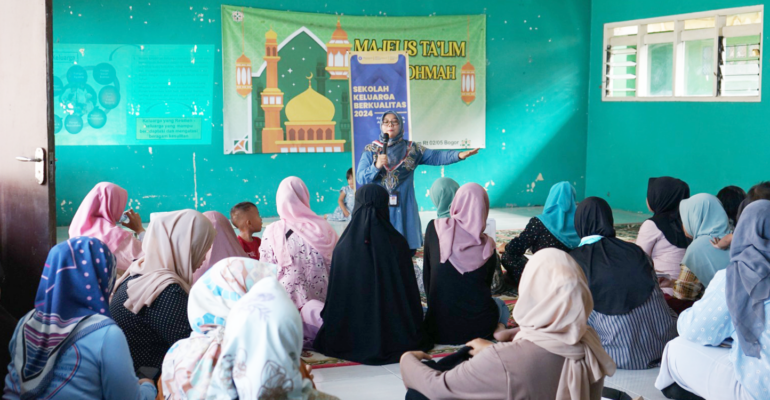IPB University Strengthens Family Functions in Margajaya Village through Quality Family School

The Directorate of Agromaritime Community Development (DPMA) IPB University in collaboration with the Department of Family and Consumer Sciences (IKK), Faculty of Human Ecology (Fema) IPB University held the second meeting of the School of Quality Families (SKB) in Margajaya Village, Dramaga, Bogor, West Java.
This meeting was themed ‘Strengthening Family Functions in the 1,000 HPK Period for Stunting Prevention’ and was hosted by Alfiasari, SP, MSi, IPB University lecturer from the Department of IKK.
The SKB program aims to improve the quality of families in the environment around the campus and strengthen the presence of IPB University in the community. Alfiasari emphasized the importance of strengthening family functions because environmental changes often have a negative impact on family life.
“Each family member has its function at each stage of family development. Family functions must be carried out so that children can grow smart and families live harmoniously,” Alfia explained.
She also added that there are eight family functions, namely religious, socio-cultural, love and affection, protection, reproduction, socialization and education, economic, and environmental functions. Good implementation of family functions will affect the welfare and quality of human resources (HR).
“If the family function is running, God willing, we will contribute to forming quality human beings and producing resilient families, families that are able to adapt,” Alfia continued.
In addition, she emphasized that family functions must also be implemented in the first 1,000 days of life (HPK), including the pregnancy phase, the infant phase aged 0-6 months, and the infant phase aged 7-23 months.
“Fathers are needed to be present in children’s lives so that they feel that their fathers also care about their lives. Not optimizing the implementation of family functions will lead to low quality of parenting which results in stunting in children,” she said.
One of the SKB participants, Mia, expressed her concern regarding the issue of stunting. “When I was pregnant, my weight was low and my body was thin. This also caused a burden on my mind so I am worried that this condition will cause stunting in my child,” she said.
In response, Alfiasari emphasized that knowledge about stunting should not trigger fear for mothers. Instead, it should be used as an alarm to control children’s development optimally. (*/Rz) (IAAS/SNI)



